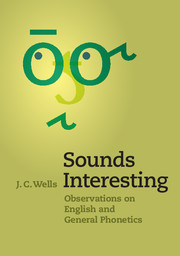Postscript
Published online by Cambridge University Press: 05 October 2014
Summary
Where did my interest in phonetics come from?
I have always been interested in languages, and particularly in pronunciation. I started French at school at about eight years of age, then Latin from age nine and Ancient Greek from age twelve. For my twelfth birthday I asked my parents to give me an Italian-English dictionary, since I had started to teach myself a little Italian. I passed my O level exams in French, Latin and Greek at age fourteen, and my A levels in Latin and Greek at age sixteen. That same year, once my exams were out of the way, I decided to teach myself Esperanto, which soon became my best language after English.
Seeing my interest in languages, my parents made the far-sighted decision when I left school at eighteen to arrange an exchange with a German family. I stayed in Kiel with the family for six weeks, followed by six weeks for their son with us in England. I was determined to make good use of this, my first trip abroad, learning German ab initio by total immersion. My exchange partner, Klaus, took very seriously the task of ensuring that by the time I came back to England I could speak fluent German. I can see in hindsight that I also picked up excellent German pronunciation habits.
- Type
- Chapter
- Information
- Sounds InterestingObservations on English and General Phonetics, pp. 201 - 202Publisher: Cambridge University PressPrint publication year: 2014



